Twenty-five years after the Srebrenica Genocide and the Dayton Accords, Bosnia still bears the scars of the early 1990s war. While corruption and organized crime thrive, the country has become the focus for Russian anti-NATO activities. The role of the EU and the international community as a whole in the region has diminished, says Bosnia expert Jasmin Mujanović in an interview with the Militaire Spectator. He concludes that the country needs to move towards a genuinely democratic regime and full membership of NATO. ‘The security afforded by membership in this Alliance would allow for a stable framework in which to eventually amend the constitution.’
Arthur ten Cate and Frans van Nijnatten
 Jasmin Mujanović PhD
Jasmin Mujanović PhD
Jasmin Mujanović PhD is Assistant Professor of Political Science and Policy Studies at Elon University, North Carolina. He specializes in the politics of post-authoritarian and post-conflict democratization. His book Hunger and Fury. The Crisis of Democracy in the Balkans (2018) examines the persistence of authoritarian and illiberal forms of governance in the Western Balkans since the end of the Yugoslav Wars. His publications also include peer-reviewed articles in academic journals, chapters in edited volumes, policy reports for Freedom House and the Friedrich Ebert Stiftung, as well as analyses in The New York Times, The Washington Post, Foreign Affairs and other media. Originally from Sarajevo, he has an active social media presence and is co-host of Sarajevo Calling. A Podcast of Southeast European Affairs. He twitters at: @JasminMuj. the text here
Bosnia has known peace for 25 years under the regime of the U.S.-brokered Dayton Peace Accords, reached on 1 November 1995 at Wright-Patterson Air Force Base in Ohio and signed by the Presidents of Bosnia, Croatia and Serbia one month later in Paris. As a keen observer of politics in the Western Balkans, Jasmin Mujanović, Assistant Professor of Political Science and Policy Studies at Elon University, North Carolina, assesses the current situation: ‘Bosnia is stable but faces serious governance challenges which, at their extreme, have begun to also create certain security concerns for both the country and the region. Corruption, organized crime, and pronounced authoritarian tendencies – especially in the Republika Srpska entity – have contributed to both growing social tensions (compare the 2014 protests,[1] the ‘Justice for David’ movement in 2018)[2] and a prevailing sense of political crises, even during moments of relative normalcy. The latter is only further heightened by the diminishing role of the EU, and the international community as a whole, in the country, and the wholesale dissolution of an enlargement [inclusion in the EU and/or NATO] perspective.’
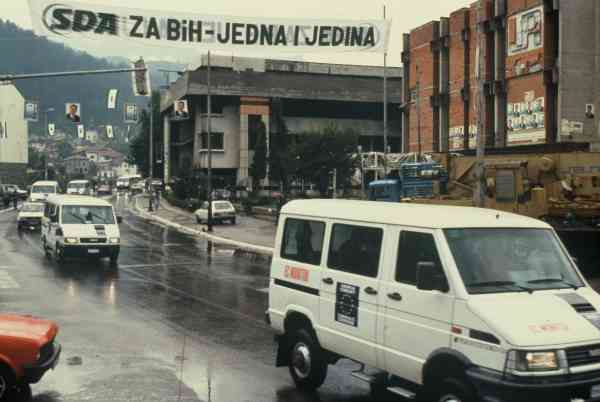
The European Union observing the 1996 elections in Bosnia; according to Jasmin Mujanović, the EU has consistently shown that it has no substantive capacity for dealing with the scale of the remaining issues in Bosnia. Photo European Union
A failed transformation
An immediate effect of the Dayton Peace Accords was the end of violence. However, from that point onwards, as Mujanović points out in his book Hunger and Fury,[3] a failed transformation followed. Bosnia as well as other countries in the region became economically stagnant. More than ever Bosnia is in the grip of a corrupt oligarchic elite. ‘No, that’s not a pretty picture but it’s important to understand that this is not an accident,’ Mujanović says. ‘Bosnia is not, strictly speaking, a ‘failed state’, above all because the existing system works extremely well for the governing elite. Which is to say, one of the key arguments of my book – and in general something that I keep at the forefront of my analysis – is that socio-economic conditions in the Western Balkans are ‘retrograde’ not because the region’s peoples are reactionary or ‘backward’, but because the political elites in the region have worked to keep conditions like that, because it profits them and their associates. This is not to deny or negate the nationalist or sectarian tendencies which do exist in the region – and which have increasingly become incorporated into the canon of the Western far-right, for instance – but it is to say that there is an important political economy dimension to these dynamics that is too often overlooked, at least in popular accounts of regional politics.’
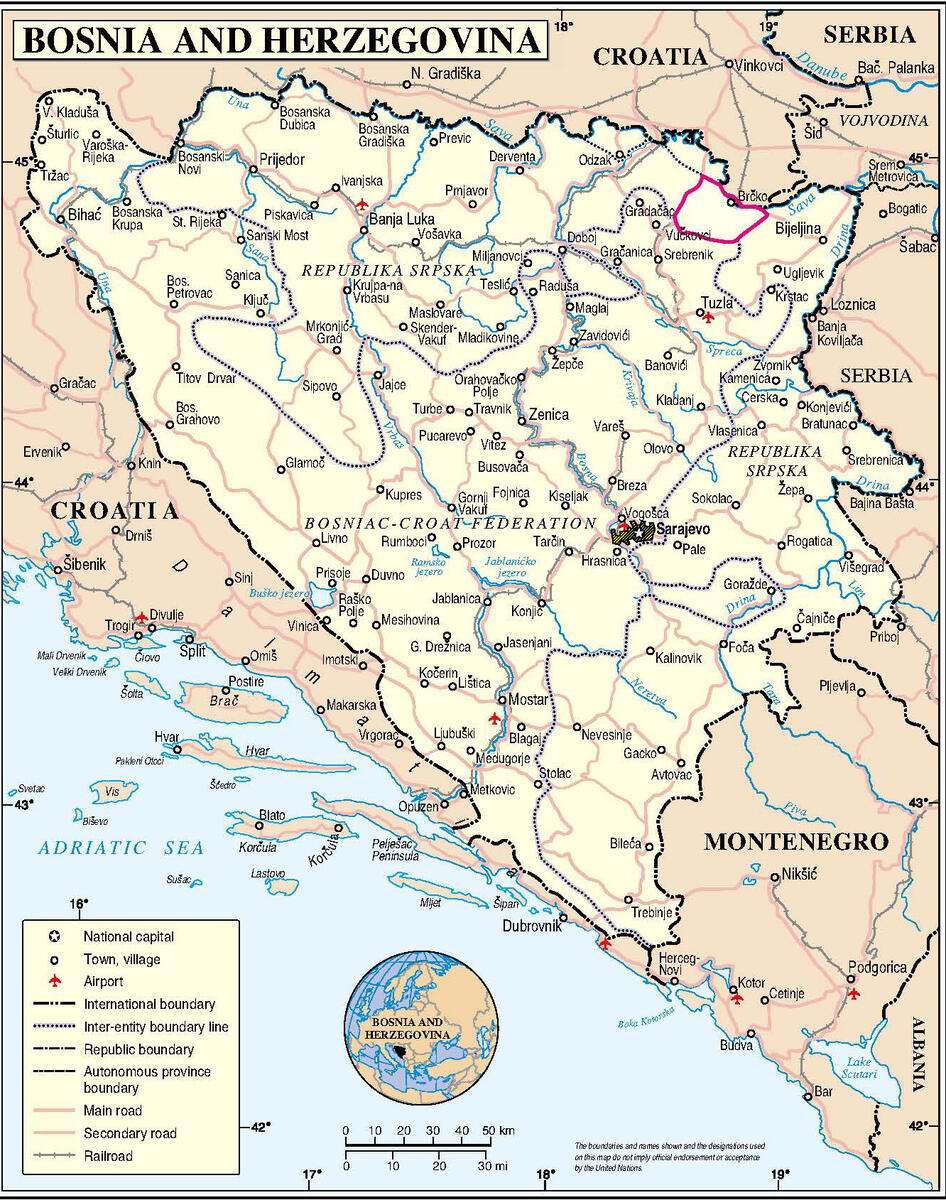
Source: United Nations Department of Peacekeeping Operations/Cartographic Section
The ‘elastic authoritarians’, as Mujanović calls them, circumvent the international arrangements for change put in place at Dayton and manage to spoil the international mechanisms that intended to transform Bosnia into a genuine democracy. Were the original motives and intentions of the Dayton project questionable to begin with? According to Mujanović, ‘the original sin’ of the Dayton project was that it ‘institutionalized the outcomes of the Bosnian Genocide through the formation of the entities and cantons. Contemporary Bosnia, in that state, remains an apartheid state, or at least a segregated state. And all such regimes are premised on negating or diluting the possibilities for genuine democratic politics, usually through their continued (re)animation of atavistic, sectarian tensions. By keeping people afraid and angry but also undermining opportunities for genuine reconciliation and accountability mechanisms to take root, you go a long way to stunting the possibilities for meaningful political evolution.’ Mujanović calls Milorad Dodik, the current Serb member of the Presidency of Bosnia and Herzegovina, ‘the living embodiment of this strategy.’
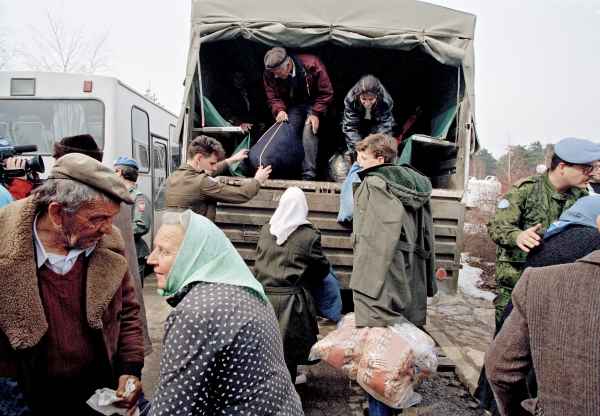
Bosnian refugees at a UN checkpoint in Stari Vitez, 1994: ‘Dayton institutionalized the outcomes of the Bosnian Genocide through the formation of the entities and cantons’. Photo UNPROFOR
Critical turning point and predatory elites
Mujanović agrees that, looking at transitional justice, at the return of refugees to ethnically cleansed areas and at political change (all objectives of the Dayton Accords), there were some positive developments in the early 2000s. At some point, however, these were cut off. ‘The critical turning point came circa 2006, with the election of the SNSD [Alliance of Independent Social Democrats] as the leading political factor in the Republika Srpska and the large-scale departure of the United States from substantive political involvement in the state and peace building process. The Dodik regime set about aggressively undermining the Dayton Accords, while both the Office of the High Representative[4] and EU largely opted not to confront them in that process. Over time, the situation grew so critical that the Republika Srpska is now a de facto one-party polity, arguably the least democratic administrative unit in the whole region, and wherein the government deliberately and aggressively undermines the rights and security of non-Serbs and returnees.’
Elaborating on the organization and nationalist ideologies of these predatory elites, Mujanović stresses the importance of historical developments. ‘I argue it goes back to the end of the 19th century and the particular fashion in which the nation-state emerged in the Western Balkans. For the most part, the anti-Ottoman and anti-Hapsburg ‘revolutions’ in the region produced minimal changes in the substantive nature of local governance regimes. In fact, one could argue that many of the Balkan revolutionaries became especially opposed to imperial rule in the 19th century because they did not want to participate in the kinds of socio-economic reforms which were beginning to take sway in most of Europe at the time. So, ironically, you have in the Balkans the dissolution of imperial regimes but the cementing of recalcitrant political dynamics. And in these, the idea of nations and nationalism has always been central. Appeals to ‘the nation’ have always been inherently reactionary in the Balkans, because they have served to prevent and subvert substantive political and economic reforms. That was as true in the 1880s, as it was in the 1980s, as it is today.’
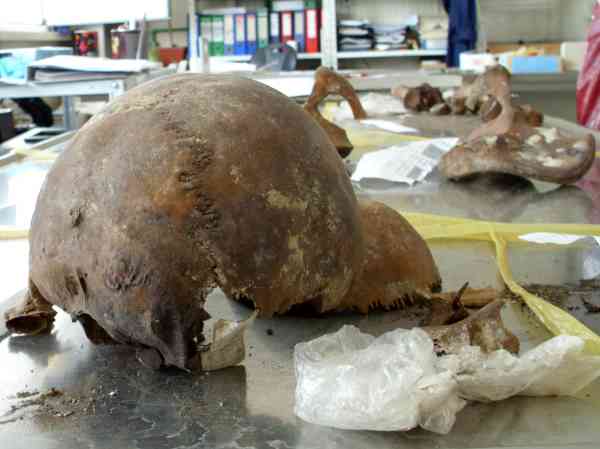
‘Genocide denial in Bosnia is a central feature of Serb nationalist discourse in the region’. Photo The Advocacy Project, Julia Dowling
Is propaganda like the denial of the Srebrenica Genocide part of the narrative that keeps these authoritarians in power and why do people, in this information age, still believe these historical distortions? ‘I don’t know whether Bosnia is especially unusual in this sense,’ Mujanović says. ‘I mean, I live in the U.S., and there’s a lot of people here who believe all kinds of incredible, absurd, fantastical things – like the QAnon conspiracy theory,[5] for instance, or Pizzagate.[6] Genocide denial in Bosnia is a central feature of Serb nationalist discourse in the region because it serves to keep the architects of such killings and such narratives in power. In that sense, the onus is on those who are the targets of such disinformation – i.e. members of the ethnic Serb community, primarily – to reject both these narratives, and the leaders who peddle them. Although, it has to be said, more and more we see how Serb ultra-nationalist narratives have become a bigger and bigger part of Western political discourses as well; compare the Christchurch terrorist,[7] Peter Handke’s Nobel Prize,[8] the prefoliation of the Great Replacement conspiracy theory[9] and so on.’
In an episode of the podcast ‘Sarajevo Calling’, which he co-produces with the journalist Aleksandar Brezar, Mujanović discussed the constant humiliation and the lack of dignity people experience under these corrupt regimes and the effect that has on everyday life.
‘It means that there is virtually no part of your everyday existence that is not somehow affected and corded by patronage, influence peddling, or corruption. Even things like obtaining an education – which you would think would serve to disrupt such patterns – serve to re-enforce them because they become prime sites for such activities. Which is, incidentally, why more and more well-educated, white-collar professionals are leaving Bosnia, and the region as a whole. Even those with well-paying jobs are looking for the exits because they do not want their children to endure the same kind of grinding humiliation as they have to put up with everyday.’
Civil society and agents for change
‘There is a tremendous degree of what I would characterize as ‘free floating energy for change’ but it has yet to be channeled in a constructive or sustainable fashion,’ Mujanović says when asked about positive developments that could lead to grassroots change, such as organized opposition and independent journalism. ‘We have seen momentary eruptions and glimmers of civil society mobilization – the 2013 ‘Baby Revolution’, the 2014 protests and ensuing plenums, the ‘Justice for David’ movement et cetera – but there is a lack of institutional agents willing or able to translate that energy into a credible program for change. Still, I think the situation in that sense is not as dire as is often assumed. The ingredients for change in Bosnia have been available for a while now. Engineering their combination remains the challenge at hand. As for media, there is actually a fairly robust media environment in Bosnia, especially as compared to, say, Serbia. Of course, the situation is not uniform across the country – again, I stress that the overall state of democracy in the Republika Srpska is markedly worse than almost anywhere else in the region, never mind just Bosnia – but Bosnia and Herzegovina, on the whole, has an – almost surprisingly – vibrant media scene.’
Part of the nationalists’ narrative is that Bosnia was never a viable political entity. But as Mujanović explains, that point of view at least partly conflicts with historic facts: ‘Bosnia is by far the most coherent political unit in the whole of the Western Balkans. And I don’t mean that as some kind of ‘patriotic’ quip, I mean quite literally: look at a map from the 14th century onward and compare the territory of modern-day Bosnia and Herzegovina to that of any of its neighbors. While the borders of Serbia and Croatia, for instance, have wildly fluctuated over the last half millennium, Bosnia is pretty much exactly where it has ever been. It is the polity between the Una-Sava to the north, the Drina to the east, Trebinje at its south, and the Livanjsko Polje [field] to its west. Those were basically its boundaries in the medieval period, those were its administrative lines in the Ottoman and Austro-Hungarian period, and with the exception of a brief spell in the first Yugoslav period and during the fascist occupation when the whole region was fractured, Bosnia has endured as a coherent and distinct political space for a remarkably long time. Granted, what Bosnia has never been is a ‘nation-state’ in the post-1789 sense of the term, but that to me is part of its strength and character, not a flaw. Those who argue that Bosnia is not ‘viable’ are quite simply historically illiterate.’
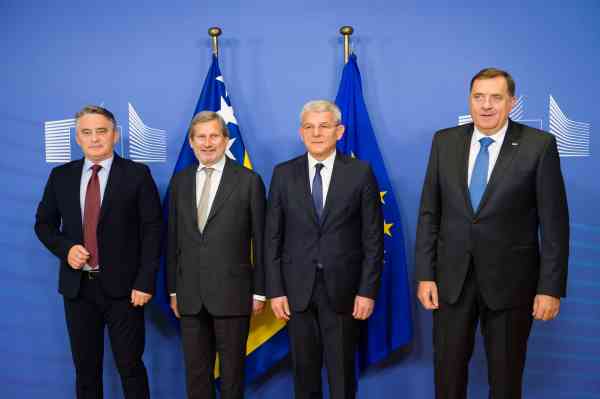
The current members of the Presidency of Bosnia and Herzegovina Željko Komšić (Croat), Šefik Džaferović (Bosniak) and Milorad Dodik (Serb) discuss relations with EU Commissioner for Budget and Administration Johannes Hahn (second from left). Photo EU, Aurore Martignoni
Bosnia and the ‘European problem’
The incorporation of Balkan states into the Euro-Atlantic community is stagnant and the West seems to be hesitant. What happened to the historical duty the countries of the West felt towards formerly communist Europe? ‘To a large extent, I would argue that ‘what happened?’ is not a ‘Western’ but specifically European problem,’ Mujanović says. ‘The first decade after the Bosnian War was marked by tremendous progress in Bosnia, in virtually every sector and segment of the state and society. But that was also the period in which the key international actor in Bosnia was the U.S., not the EU. That began to change with the Thessaloniki Summit in 2003, but the transition really picked up steam after 2006-2008. That’s when the shift from U.S. to EU primacy in Bosnia and in the Western Balkans was cemented. And since then, the wheels have almost completely fallen off the state-building and democracy promotion project in Bosnia, but also in the region. The EU has since consistently shown that it has no substantive capacity for dealing with the scale of the remaining issues in Bosnia, and I confess, in many capitals, I fear there is simply a lack of interest. As a result, ‘Europe’ has opted at nearly every turn for stop-gap and ad hoc agreements with local political strongmen instead of investing in substantive institution and capacity building. Why? Because too few within the key capitals wanted to take responsibility for the job still remaining in Bosnia, so it became a process of perpetual buck-passing and increasingly more convoluted accession and enlargement criteria, reform packages and initiatives, but even that was undermined by a continually eroding degree of interest or capacity – again, especially in key capitals.’
Full membership of the Atlantic Alliance would be a massive step forward: ‘Point being, for Bosnia’s own best interests, I think NATO remains an existential priority and every effort should be made at the domestic level to achieve that objective. And Europe should likewise recognize how little of its credibility remains intact in the Balkans, and that incorporating Bosnia, in particular, into the Alliance would be a massive symbolic – but also strategic – coup in an era when such triumphs are increasingly few and far between. Bosnia was the site of NATO’s first combat operations in its history. And today it is the focal point of the new geopolitical wrangling that has gripped Southeastern Europe. Incorporating Bosnia into NATO is thus both savvy and necessary. Because so long as this polity remains unstable, this entire region will remain alike.’
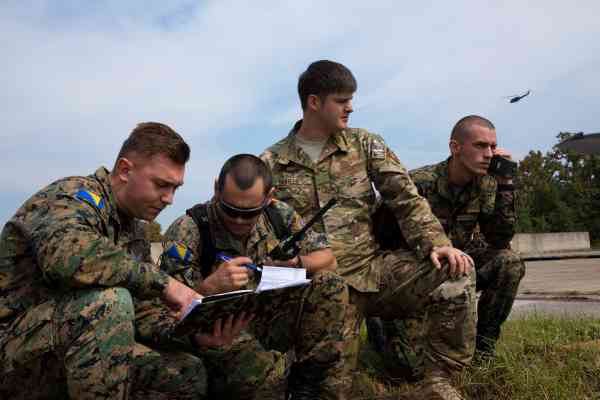
Once the site of NATO’s first combat operations in its history, becoming an Alliance member is now an existential priority for Bosnia, says Jasmin Mujanović. Photo U.S. Army, Natalee Ebanks
Historical revisionism
Croatia has become a member of the EU, while Serbia is moving towards that. Do these countries respect the Dayton Accords and how does Mujanović qualify their current relationship with Bosnia? ‘As concerns Serbia, the fact of the matter is that there has simply never been a meaningful historical reckoning in that country’s political class with their authorial role in the Bosnian War and the entire Yugoslav dissolution. Worse, the current political leadership in Belgrade is committed to revanchism rather than reconciliation. And those tendencies have only grown more pronounced as Serbia has become less democratic, in particular under the tenure of [current President] Aleksandar Vučić. Which is to say, the current Serbian regime remains fundamentally hostile to Bosnia’s sovereignty and territorial integrity, and routinely engages not only in genocide revisionism but wholesale historical revisionism. Consider only the frequent refrain from Vučić’s Belgrade that ‘Serbia is a guarantor of the Dayton Accords’; it is no such thing. Serbia is a signatory to the Dayton Accords because it was recognized as one of the three warring parties in the Bosnian War, along with Croatia and the Republic of Bosnia and Herzegovina. The Bosnian War, in short, was not a civil war – and Serbia, the primary aggressor and architect of the entire conflict, has continued a kind of political warfare against the Bosnian state, primarily via its proxies in the Dodik regime, which continues to make genuine political reform in Bosnia challenging, to say the least. As for Croatia, there are some broad similarities with the Serbian case, specifically as concerns the ties between the Zagreb HDZ [Croatian Democratic Union] and its Bosnian sister party, the HDZ BiH. The difference is that Croatia is a democratic state, and the Croatian center-left has historically been quite constructive on Bosnia. I’m thinking here, especially, of somebody like former President Stjepan Mesić. It is frustrating that relations between Zagreb and Sarajevo have become so chilly in recent years, but it would take comparatively little to reboot that relationship – to the benefit of Croatia, Bosnia, and the EU and NATO both.
The role of Russia
Russia is allegedly meddling in the political process in Bosnia and its 2014 annexation of Crimea seems to have strengthened the secessionists. Have the Balkans become a Russia-EU battleground? ‘Russia has taken an aggressive posture towards the entire Western Balkans since 2013-2014, although it has been acting at the margins much longer than that, obviously,’ Mujanović observes. ‘Moscow’s invasion of Ukraine prompted the Kremlin to begin poking at the underbelly of the Atlantic community as a means of strategic deterrence, essentially. And preventing further NATO enlargement has become the central pillar of its approach to the Western Balkans, as we learned very clearly from the release of formerly classified documents after the fall of the Gruevski government in North Macedonia in 2016. With the failure of its anti-NATO posture in both North Macedonia and Montenegro – despite a coup attempt in the latter in 2016, and a near-coup in the former in 2017 – Bosnia has become the focus for Russia’s regional anti-NATO activities. Bosnia is, in many ways, the centerpiece of this strategy because it is the central strategic polity in the region. In short, as goes Bosnia, so go the Western Balkans. Moscow knows that if Bosnia manages to secure membership in NATO, Russia will lose virtually all practical capacity for chaos in the region. Even its heavy investments in Serbia will not matter much at that juncture because Belgrade will be checked in every direction by NATO, and Kosovo, even if it remains nominally outside the Euro-Atlantic fold, will still enjoy the de facto protection of the Alliance. As such, Russia has redoubled efforts to buttress both the secessionist activities of the Dodik regime, and to lend greater political support to [former Croat member of the Presidency of Bosnia and Herzegovina] Dragan Cović and his HDZ bloc; hence the latter’s recent trip to Russia, and growing ties with local representatives of Moscow in Bosnia itself. There has been a host of other Russian-sponsored activities in Bosnia since then – visits by the Night Wolves[10] and other paramilitary figures, back channel funds, the construction of churches et cetera – but the broad direction of the Kremlin’s aims in Bosnia are as laid out above.’
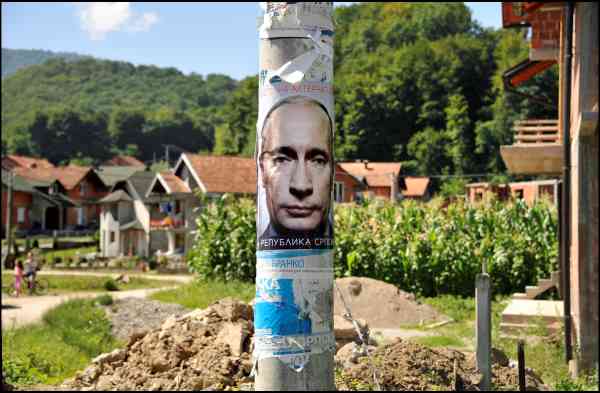
A portrait of Russian President Vladimir Putin in Serb-dominated Bratunac, where the yearly commemorative Mars Mira for the Srebrenica massacre passes. Credit: Photo Hollandse Hoogte, Flip Franssen
Meanwhile, leaders are using the coronavirus crisis for their own political purposes, Mujanović says. ‘From a practical health standpoint, the region has actually performed quite well. Governments and local populations have taken the situation seriously and are making the necessary moves to curb the spread of the virus. The bigger issue is that some regional leaders – in particular Vučić – have also used this moment to score geopolitical points with China – and Russia, particularly in the case of the Dodik government – while seeking to undermine and discredit the response of the EU and the broader West. But that, as noted before, is largely in keeping with the existing policy regimes of these governments.’[11]
Revision of ‘Dayton’
‘The revision of Bosnia’s constitution, which is to say Annex IV of the Dayton Accords, is inevitable,’ Mujanović concludes. ‘Fundamentally, we need to move towards a genuinely democratic regime, one that will replace the existing sectarian system with one that stresses individual rights for all citizens, as well as robust protections for all ethnic communities within the country. In other words, we need to move towards a system that will replace the notion of ‘constitutive peoples’ with actual democratic citizenship, in line with European standards. Even so, I’m not sure that this is the most pressing or realistic scenario at this juncture,’ he stresses. ‘At the international level, as stated, Bosnia’s priority is membership in NATO. The security afforded by membership in this Alliance would allow for a stable framework in which to eventually amend the constitution. But in the interim, we have to be still more focused on a thorough and substantive campaign to root out corruption and organized crime in Bosnia and Herzegovina, especially as concerns the country’s sclerotic political class. These represent an albatross around the country’s neck, and until it is lifted it is difficult to imagine realizing very many meaningful gains – or at least ones that will be particularly lasting.’
[1] In February 2014 protests and riots over jobs and unpaid salaries broke out in the Bosniac-Croat Federation.
[2] A protest movement in the Republika Srpska led by Davor Dragičević, who claimed his son David was murdered and accused authorities of thwarting the investigation.
[3] Jasmin Mujanović, Hunger and Fury. The Crisis of Democracy in the Balkans (London, Hurst, 2018).
[4] The international institution with its head office in Sarajevo responsible for overseeing the implementation of civilian aspects of the Dayton Peace Agreement.
[5] A theory which centers on an alleged high-level official in the U.S. government (‘Q’), who is believed to have insight into a deep-state conspiracy ring that President Donald Trump will help defeat.
[6] A conspiracy theory which claimed that 2016 Presidential candidate Hillary Clinton was running a child sex ring out of Comet Ping Pong, a pizzeria in Washington, D.C.
[7] Brenton Tarrant played a Serb anti-Muslim song shortly before killing 51 people in mosques in Christchurch, New Zealand in 2019.
[8] Austrian author Peter Handke, who received the Nobel Prize for Literature in 2019, has been widely criticized for his pro-Serbian attitude during the Yugoslav Wars.
[9] A theory popular among white supremacists who believe in a conspiracy aimed at replacing whites in Europe and the United States by migrants from the Middle East and Africa.
[10] A Russian motor cycle club with close ties to the Kremlin and President Vladimir Putin.
[11] The coronacrisis also led to a new corruption scandal, see: Jasmin Mujanović, ‘Bosnia’s ‘Raspberry-Respirator Affair’ Might be a Fruitful Opportunity’, Balkaninsight, May 4, 2020.